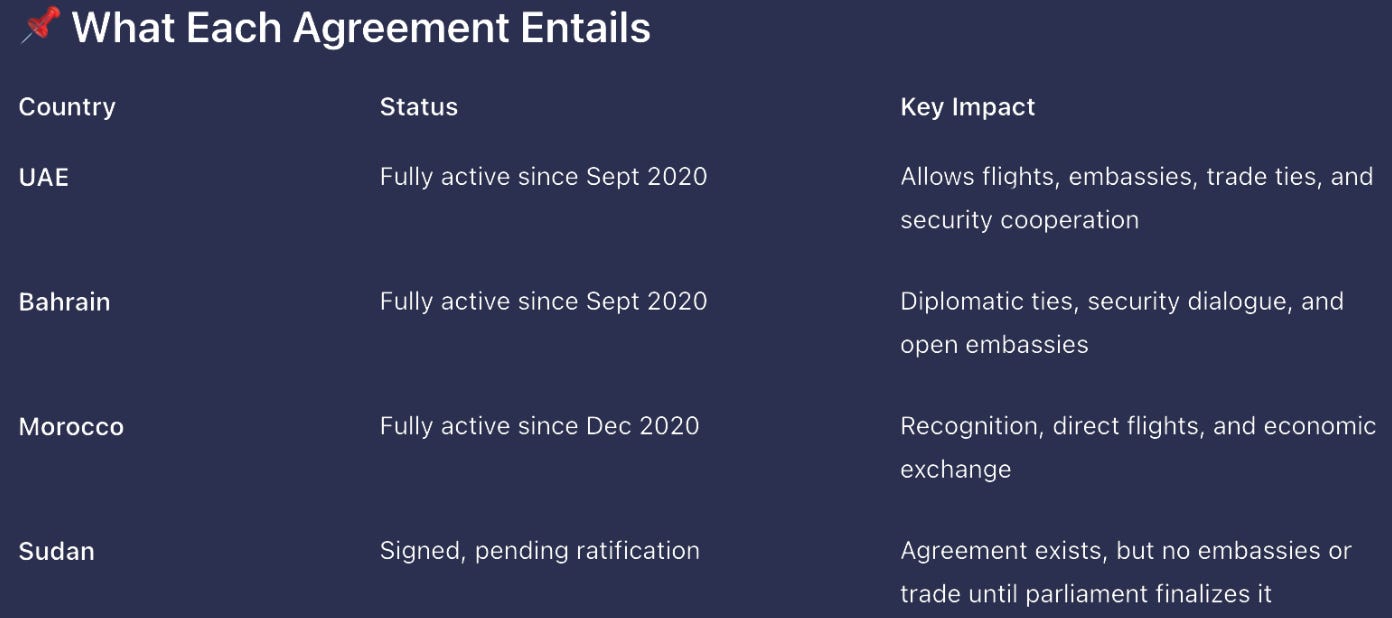The Peace Deal Most Americans Have Never Heard Of
A 2020 Peace Deal That Could Be the Key to Calming Today’s Chaos, if it's not too late
The war in Israel and Iran isn’t just another war—it’s being described by some in Iran as a holy war. Words like martyr, jihad, and divine duty are appearing in official speeches and media broadcasts across the region. For Iran, this conflict is deeply rooted in religious ideology, where dying in battle can be seen as a sacred act. For Israel, it’s a fight for survival—militarily, culturally and spiritually. This war is not just about territory or politics. It’s about identity, prophecy and deeply held beliefs. And that’s what makes it far more dangerous—and far harder to resolve.
📜 What Are the Abraham Accords?
In 2020, something unexpected happened in the Middle East: peace agreements were signed between Israel and several Arab nations—starting with the United Arab Emirates and Bahrain. These historic deals, known as the Abraham Accords, were brokered by the United States under the Trump administration. The Accords marked the first time in decades that Arab countries officially recognized and normalized relations with Israel without demanding a resolution to the Israeli-Palestinian conflict first. The goal? Strengthen regional stability, promote economic cooperation, and push back against the growing influence of Iran.
The Abraham Accords are a series of normalization agreements signed in 2020 between Israel and several Arab states, facilitated by the U.S.:
September 15, 2020: Israel formalizes diplomatic relations with the UAE and Bahrain at the White House reuters.com+15carnegieendowment.org+15britannica.com+15.
December 10, 2020: Israel and Morocco sign a bilateral normalization agreement en.wikipedia.org.
October 23, 2020: Israel and Sudan reach a normalization deal—the first phase was signed, but Sudan’s parliament has not fully ratified it, so implementation remains pending thesecuritydistillery.org+2en.wikipedia.org+2en.wikipedia.org+2.
🌍 Why It Matters—Then & Now
Breaking decades of non-recognition
These were the first Arab-Israeli normalization deals since the 1990s reuters.com+1reuters.com+1carnegieendowment.org+1arabcenterdc.org+1.Shared strategic interests
Motivations included economic partnerships, technological collaboration, and security concerns, particularly about Iran apnews.com+15jpost.com+15atlanticcouncil.org+15.Resilience in a region at war
Though regional violence—including the ongoing Israel-Iran conflict—has intensified, Accords remain operational. Diplomatic, trade, and technological cooperation continue moderndiplomacy.eu+7carnegieendowment.org+7reuters.com+7.
🔍 Why It Matters Today
Only functioning peace framework in a region where war is widespread en.wikipedia.org+1atlanticcouncil.org+1.
Builds economic and tech links even amidst conflict .
Acts as a strategic bulwark against regional aggression nypost.com+15atlanticcouncil.org+15reuters.com+15.
Seen as a diplomatic platform for potentially adding more nations—like Syria or Saudi Arabia .
🕊️ Could the Abraham Accords Help De-Escalate the Israel–Iran Conflict?
While the Abraham Accords don’t involve Iran directly, they could still play a quiet but powerful role in shaping what happens next.
Here’s how:
1. Backchannel Diplomacy
Countries like the UAE and Bahrain now have formal ties with both the U.S. and Israel, but also maintain relationships with Iran. That makes them ideal neutral ground for off-the-record talks, intelligence sharing, or humanitarian negotiations.
2. Regional Pressure
The more Arab countries publicly support peace with Israel, the more isolated Iran becomes if it chooses aggression. This could influence Iranian decisions behind the scenes—especially if other countries push for restraint.
3. A Model for the Future
The Accords show it is possible for nations with decades of mistrust to find common ground—not through complete agreement, but through shared interests like:
Water and energy security
Economic survival
Counterterrorism coordination
If a post-war scenario emerges, the Accords could be the blueprint to bring more countries—maybe even Iran—into a more cooperative regional framework someday.
⚖️ Final Thought
The Abraham Accords are not a silver bullet. But in a region torn apart by violence, they remain the only functioning roadmap to peace.
As of June 18, 2025, Israel and Iran are engaged in open conflict:
Israel has carried out targeted airstrikes on Iranian military and nuclear facilities.
Iran has responded with ballistic missiles and drone attacks on Israeli cities, including Tel Aviv and Haifa.
Civilian and military casualties have been reported on both sides.
The broader region is on edge, with proxy forces—like Hezbollah in Lebanon, militias in Iraq and Syria, and the Houthis in Yemen—threatening to escalate the fight.
While the United States has not formally entered the war, it has provided logistical support, intelligence, and regional defense assets to protect allies and contain the conflict.
In this volatile moment, the Abraham Accords remain one of the few active diplomatic bridges between Israel and the Arab world. These ties could:
Serve as channels for backdoor communication,
Offer regional pressure points for de-escalation,
And shape the post-war rebuilding process, if and when the time comes.
In a world where too many doors are closing, the Accords might be the one still open.





